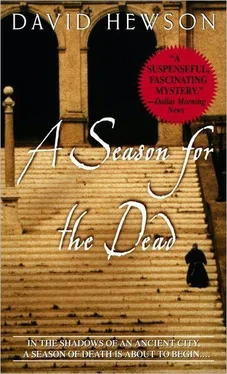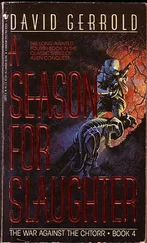David Hewson - A Season for the Dead
Здесь есть возможность читать онлайн «David Hewson - A Season for the Dead» весь текст электронной книги совершенно бесплатно (целиком полную версию без сокращений). В некоторых случаях можно слушать аудио, скачать через торрент в формате fb2 и присутствует краткое содержание. Жанр: Старинная литература, на английском языке. Описание произведения, (предисловие) а так же отзывы посетителей доступны на портале библиотеки ЛибКат.
- Название:A Season for the Dead
- Автор:
- Жанр:
- Год:неизвестен
- ISBN:нет данных
- Рейтинг книги:3 / 5. Голосов: 1
-
Избранное:Добавить в избранное
- Отзывы:
-
Ваша оценка:
- 60
- 1
- 2
- 3
- 4
- 5
A Season for the Dead: краткое содержание, описание и аннотация
Предлагаем к чтению аннотацию, описание, краткое содержание или предисловие (зависит от того, что написал сам автор книги «A Season for the Dead»). Если вы не нашли необходимую информацию о книге — напишите в комментариях, мы постараемся отыскать её.
A Season for the Dead — читать онлайн бесплатно полную книгу (весь текст) целиком
Ниже представлен текст книги, разбитый по страницам. Система сохранения места последней прочитанной страницы, позволяет с удобством читать онлайн бесплатно книгу «A Season for the Dead», без необходимости каждый раз заново искать на чём Вы остановились. Поставьте закладку, и сможете в любой момент перейти на страницу, на которой закончили чтение.
Интервал:
Закладка:
From a professional point of view it was the early works—the priceless codices and incunabula—which were the focus of her attention. Even so, she was unable to prevent herself stealing a glance at the material from the Middle Ages on.
In a sense, she felt she had listened to Petrarch and Thomas Aquinas in person. Their voices remained, like dead echoes on the dry vellum and the ancient stain of ink they had left on the page. These traces made them human and, for all their wisdom, for all their skill with words, without their humanity they were nothing, though Hugh Fairchild would probably disagree.
There was a noise from the entrance, a half shout, not loud in itself but, given the setting, disturbing. No one ever shouted in the Reading Room of the Vatican Library.
Sara raised her head and was surprised to see a familiar figure walking toward her. He moved briskly through the bands of sharp light that fell through the window, with a swift, determined intent that seemed out of place in these surroundings, wrong. The airconditioning rose in volume. A chill blanket of air fell over her and she shivered.
She looked again. Stefano Rinaldi, a fellow professor at the university, carried a large, bulging plastic bag and was crossing the empty Reading Room with a determined stride. There was an expression on his round, bearded face which she failed to recognize: anger or fear or a combination of both. He was wearing his customary black shirt and black trousers but they were disheveled and there were what looked like wet stains on both. His eyes blazed at her.
For no reason, Sara Farnese felt frightened of this man whom she had known for some time. “Stefano…” she said softly, perhaps so quietly he was unable to hear. The commotion was growing behind him. She saw figures waving their arms, beginning to race after the man in black with the strange, full supermarket bag dangling from his right hand. And from his left, she saw now, something even odder: what appeared to be a gun, a small black pistol.
Stefano Rinaldi, a man she had never known to show anger, a man for whom she once felt a measure of attraction, was walking purposefully across the room in her direction holding a gun, and nothing she could imagine, no possible sequence of events, could begin to explain this.
She reached over, placed both hands on the far side of the desk and swung it around ninety degrees. The old wood screeched on the marble floor like an animal in pain. She heaved at the thing until her back was against the glass and the desk was tight against her torso, not questioning the logic: that she must remain seated, that she must face this man, that this ancient desk, with a tenth-century copy of a Roman recipe book and a single notebook computer on it, would provide some protection against the unfathomable threat that was approaching her.
Then, much more swiftly than she expected, he was there, gasping for breath above her, that crazy look more obvious than ever in his dark brown eyes. He sat down in the chair opposite and peered into her face. She felt her muscles relax, if only a little. At that moment, Sara was unafraid. He was not there to harm her. She understood that with an absolute certainty that defied explanation.
“Stefano…” she repeated. There were shapes gathering behind him. She could see Guido Fratelli among them. She wondered how good he was with his gun and whether, by some unfortunate serendipity, she might die that day from the stray bullet of an inexperienced Swiss Guard with a shaking hand that pointed the gun at a former lover of hers who had, for some reason, gone mad in the most venerated library in Rome.
Stefano’s left arm, the one holding the weapon, swept the table, swept everything on it, the precious volume of Apicius, her expensive computer, down to the hard marble floor with a clatter. She was silent, waiting, which was, his eyes seemed to say, what he wanted. Then Stefano lifted up the bag to the height of the desk, turned it upside down, let the contents fall onto the table and said, in a loud, commanding voice that was half insane, half dead, “The blood of the martyrs is the seed of the Church.”
She looked at the thing in front of her. It had the consistency of damp new vellum, as if it had just been rinsed. Apicius would have written on something very like this once it was dry.
Still holding the gun with his left hand, Stefano began to unravel the pliable thing before her, stretching it, extending the strange fabric until it filled the broad mahogany top of the desk then flowed over the edges, taking as it did a shape that was both familiar and, in its present context, utterly foreign.
Sara forced her eyes to remain open, forced herself to think hard about what she was seeing. The object which Stefano Rinaldi was unfolding, smoothing out so carefully with the flat palm of his right hand as if it were a tablecloth perhaps, on show for sale, was the skin of a human being, a light skin somewhat tanned, and wet, as if it had been recently washed. It had been cut roughly from the body at the neck, genitals, ankles and wrist, with a final slash down the spine and the back of the legs in order to remove it as a whole piece and Sara had to fight to stop herself reaching out to touch the thing, just to make certain this was not some nightmare, just to know.
“What do you want?” she asked, as evenly as she could.
The brown eyes met hers, then glanced away. Stefano was afraid of what he was doing, quite terrified, yet there was some determination there too. Stefano was an intelligent man, not stubborn, simply single-minded in his work, which was, she now recalled, centered around Tertullian, the early Christian theologian and polemicist whose famous diktat he had just quoted. “Who are the martyrs, Stefano?” she asked. “What does this mean?”
He was sane at that moment. She could see this quite clearly in his eyes, which had become calm. Stefano was thinking this through, searching for a solution. He leaned forward. “She’s still there, Sara,” he said, in the tobacco-stained growl she recognized, but speaking very softly, as if he wished no one else to hear. “You must go. Look at this.” He stared down at the table and the skin on it. “I daren’t…” There was terror in his face, though; in this context, it seemed ridiculous. “Think of Bartholomew. You must know.”
Then, in a much louder voice, one that had the craziness back inside it again, he repeated Tertullian, “The blood of the martyrs is the seed of the Church.”
Stefano Rinaldi, his eyes now black and utterly lost, lifted the gun, raised it until the short, narrow barrel pointed at her face.
“Down!” the guard screamed. “Down!”
Guido was an idiot. Sara knew that instinctively, knew he could not be seeing this scene and reading it the way she did. “No!” she insisted, raising a hand, to both men, and saw, to her dismay, Stefano’s gun move in front of her again, going higher. “Both of you! Stop this!”
Guido screamed, gibberish that was both fear and anger. He was out of control. And Stefano merely stared at her, stared with those mournful, forsaken eyes, an expression that finally began to make her feel cold since it seemed to contain so much dead fatalism inside it. He mouthed a single word: “Hurry.”
“Don’t,” she said, to both of them, knowing it was useless.
An explosion rang from Guido’s gun. The room was enveloped by a sound that made her ears scream with pain. Stefano Rinaldi’s scalp opened up and issued a livid burst of blood and tissue. Then Guido was dancing around the dead man, wishing he dared touch the corpse now slumping to the floor, letting the gun jerk in his hand as if it had some mind of its own.
She closed her eyes and listened to the sound of fire, heard the bullets whistling around the room, the quiet room, the place of many splendors, a room she had grown to love. When it was done, Sara Farnese opened her eyes. Stefano lay motionless on the floor. One of the attendants was close by, shrieking, his hands holding his stomach as if he dared not let go for fear of what might tumble out.
Читать дальшеИнтервал:
Закладка:
Похожие книги на «A Season for the Dead»
Представляем Вашему вниманию похожие книги на «A Season for the Dead» списком для выбора. Мы отобрали схожую по названию и смыслу литературу в надежде предоставить читателям больше вариантов отыскать новые, интересные, ещё непрочитанные произведения.
Обсуждение, отзывы о книге «A Season for the Dead» и просто собственные мнения читателей. Оставьте ваши комментарии, напишите, что Вы думаете о произведении, его смысле или главных героях. Укажите что конкретно понравилось, а что нет, и почему Вы так считаете.












